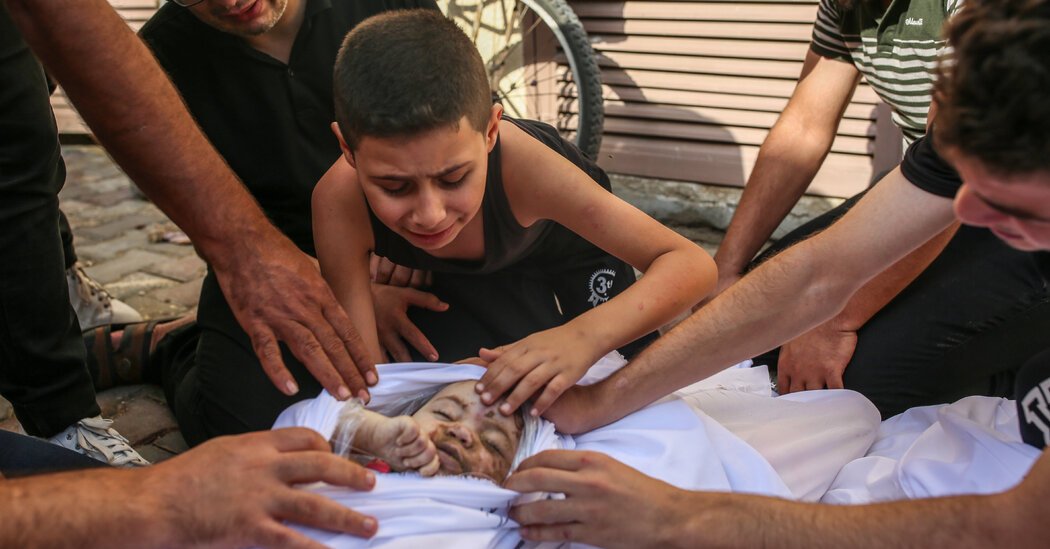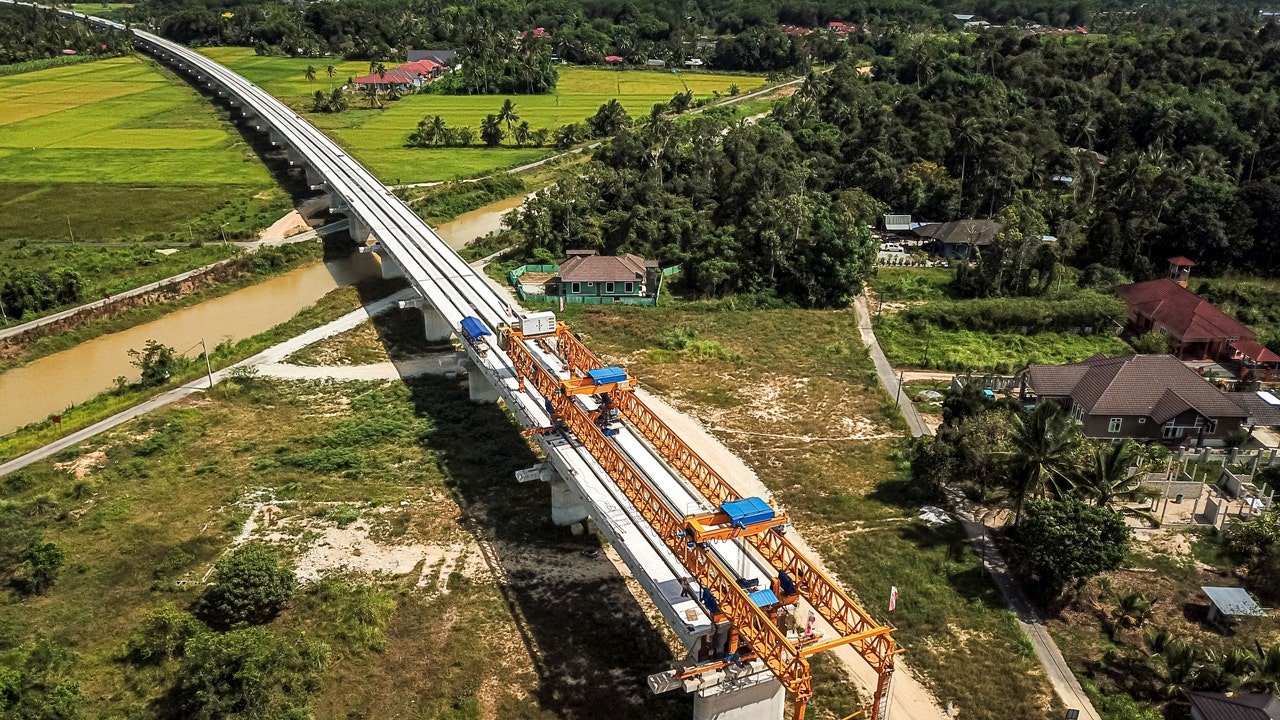The war in Gaza had barely begun when 9-year-old Khaled Joudeh suffered an unimaginable loss. His mother, father, older brother and baby sister, along with dozens of other relatives, were all killed in an Israeli airstrike on their home.
In the months that followed, Khaled tried to be brave, his uncle, Mohammad Faris, recalled. He would comfort his younger brother Tamer, who, like Khaled, had survived the Oct. 22 strike that killed their family. But Tamer, 7, was left badly injured with a broken back and a broken leg, and was in constant pain.
“He would always quiet his brother when he cried,” Mr. Faris told The New York Times in a recent phone interview. “He would tell him: ‘Mama and Baba are in heaven. Mama and Baba would be sad if they knew we were crying because of them.’”
At night, when the unrelenting Israeli airstrikes on Gaza would start up again, Khaled would wake up shaking and screaming himself, sometimes running to his uncle to seek comfort.
It was a short and terrifying existence for the young brothers that ended when another airstrike hit the family home where they were sheltering on Jan. 9, killing Khaled, Tamer, their 2-year-old cousin, Nada, and three other relatives, according to two family members.
Their story epitomizes how the 10-month-old Israeli war in Gaza has taken an exceptional toll on children, who are caught in the middle of the conflict.
After the Oct. 7 Hamas-led attack on Israel, the Israeli military launched the war with the stated aim of eradicating Hamas, unleashing one of the heaviest aerial bombardments the world has seen in this century on densely populated Gaza. Israel has accused Hamas of taking advantage of Gaza’s urban terrain to provide its fighters and weapons infrastructure with an extra layer of protection, running tunnels under neighborhoods, launching rockets near civilian homes and holding hostages in city centers.
Hamas denies these accusations and says its members are Gazans themselves and live among the population.
International law experts have said that Israel has a responsibility to protect civilians, even if Hamas exploits them the way Israel says it does. The Israeli military says it takes “all feasible precautions” to mitigate harm to civilians.
The children of Gaza have suffered in myriad ways. Of the tens of thousands of Palestinians killed in the war, an estimated 15,000 were under 18, according to Gazan health officials. The United Nations estimates that at least another 19,000 children have been orphaned. And nearly one million children have been displaced, according to UNICEF, the U.N. children’s agency.
“Gaza remains the most dangerous place in the world for children,” said Jonathan Crickx, a spokesman for UNICEF.
Most children are living in overcrowded homes where multiple families shelter together, or in ramshackle tents that can feel like ovens in the summer heat, lacking both running water and sanitation. Thousands are severely malnourished and at risk of dying of hunger.
The United Nations called on Friday for a weeklong cease-fire in Gaza to allow vaccinations to prevent an outbreak of polio, saying many children were at risk. The same day, the first case of polio in the enclave in many years was confirmed by the Gaza health ministry.
It has been a constant struggle just to survive in Gaza, and children have had to help out.
When he visited the territory a few months ago, Mr. Crickx said, he rarely saw children playing or laughing. Instead, he mostly saw them helping their families: carrying jugs of water from filling stations, trying to find food, and helping to move their few belongings when the family was displaced.
Mr. Crickx said he had seen a boy on the street who appeared to be no older than about 5, pushing a wheelchair with two jerrycans, which he had filled with water, resting on the seat. The handles of the wheelchair were higher than the top of the boy’s head and he could barely see where he was going.
“There is no childhood in Gaza,” Louise Wateridge, a spokeswoman for the main U.N. agency that aids Palestinians, UNRWA, wrote on social media last month. “Malnourished, exhausted. Sleeping in rubble or under plastic sheeting. Same clothing for 9 months. Education has been replaced by fear & loss. Loss of life, home & stability,” she added.
Throughout the war, parents have gone to extraordinary lengths to try to protect their children.
They scrawl their children’s names directly onto their skin to identify them if they are lost, orphaned or killed. At morgues, burial shrouds are cut into smaller pieces to wrap the youngest victims. Sometimes, children’s bodies are wrapped in the same shroud as their parents, laid to rest on the chest of their mother or father.
Some parents quietly say that if their child is killed, they hope they will at least die in one piece and have someone to bury them.
In the first weeks of the conflict, families began planning for the worst. Khaled’s father told his relatives that if any of them were killed, those who survived must protect and educate the children, Mr. Faris said.
Not long after that, on Oct. 22, an Israeli airstrike destroyed two buildings where Khaled’s extended family was living in the town of Deir al-Balah, in central Gaza, according to relatives and local journalists.
Khaled and Tamer were the only ones in their immediate family to survive. Nada, their 2-year-old cousin, was the sole survivor of that first strike from her own immediate family.
Just after the October strike, in the courtyard of the morgue where dozens of shrouded bodies were laid out on the ground, Khaled, barefoot and crying, kissed the faces of his parents and siblings a final, sorrowful farewell.
A total of 68 members of Khaled’s extended family were killed that day as they slept in their beds, according to accounts at the time from three of the boy’s relatives. They were laid to rest together, side by side, in a mass grave.
For nearly a month after their parents were killed, Khaled and Tamer stayed with their uncle, Mr. Faris, in another family building in Deir al-Balah. Khaled, Tamer and Nada would occasionally venture out to play in the rubble-lined street.
“They are kids and would try to hold on to their childhood,” Mr. Faris said. “They would play outside at certain points of calm. But then airstrikes would often send them back screaming,” he added.
“He would come quickly and hide near me,” Mr. Faris said of Khaled.
Then, on Jan. 9, Khaled’s all-too-short life came to an end.
About 2 a.m., as the family slept, an Israeli airstrike hit the home where they were sheltering, according to Mr. Faris and another relative, Yasmeen Joudeh, 36. Khaled, Tamer and Nada were killed, along with two uncles and their grandfather.
The body of the grandfather, who had recently returned to live with them, was found in the street. He had survived long enough to stagger out of the bombed building, cradling Nada’s body in his arms, said Ms. Joudeh, who was in Egypt at the time and heard the details from relatives in Gaza later.
The Times learned of Khaled’s death months afterward.
When asked about the strikes on the Joudeh family homes in October and January, the Israeli military did not provide a reason.
Regarding the October attack, the military said only that it could not address questions about a strike on this family.
After the January strike, The Times gave the military the date, time and street location. But the military said The Times “did not provide the I.D.F. with enough information in order to properly look into the alleged strike,” and asked for the coordinates to pinpoint the location of the building that was hit.
Mr. Faris said that his extended family was not associated with any of the Palestinian armed groups that Israel says it has been targeting in the war in Gaza.
“They had nothing to do with anything,” he said.
Like other members of their family — and so many other Gazans since — the three children, their grandfather and the two uncles were buried together in an unmarked grave.
Samar Abu Elouf contributed reporting.




